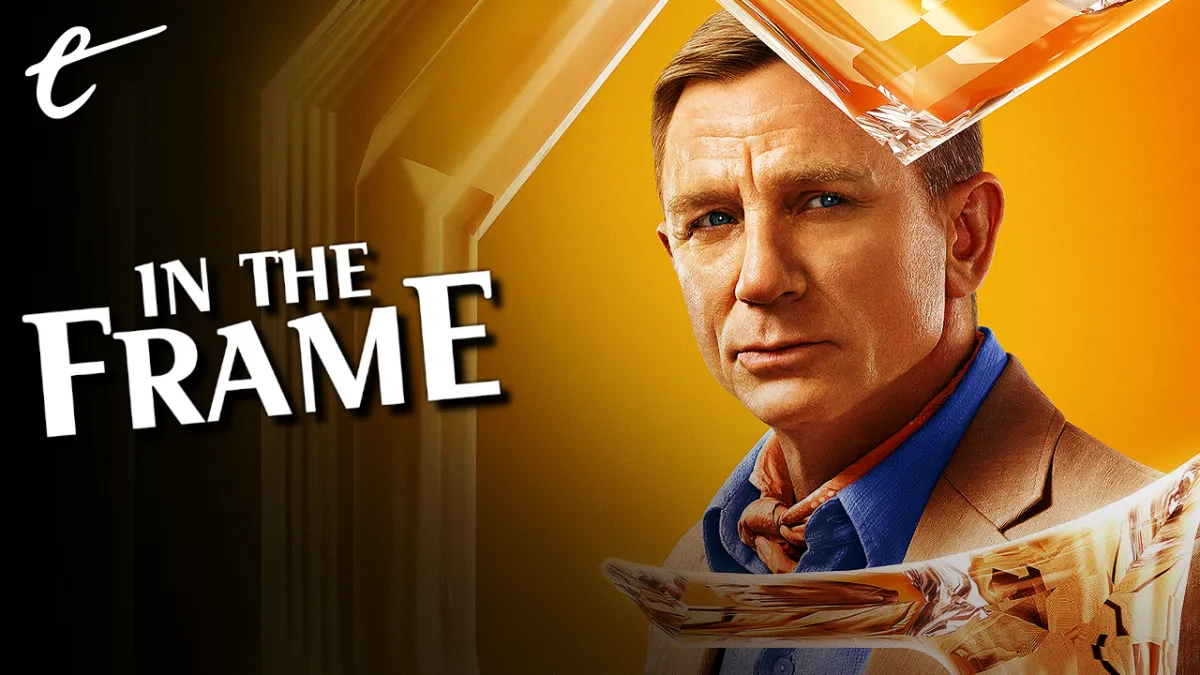This article contains spoilers for Glass Onion: A Knives Out Mystery, streaming now on Netflix, in its discussion of how the film takes aim at so-called tech disruptors like, incidentally, Netflix.
If Glass Onion isn’t biting the hand that feeds, it is at least chewing it over.
The original Knives Out was a phenomenal success. The film’s theatrical release was a huge part of that. It was the second highest-grossing original movie of 2019, behind Jordan Peele’s Us and ahead of Quentin Tarantino’s Once Upon a Time in Hollywood. It was Lionsgate’s widest opening ever in the United Kingdom. It was in wide release for four weeks longer than Star Wars: The Rise of Skywalker and was outgrossing it on a day-to-day basis by the end of that run.
It was at once inevitable and disappointing that a streaming behemoth took an interest in this emerging potential franchise. Netflix signed a deal for $450 million to produce and distribute the first two sequels to Knives Out, a figure more than 10 times the $40 million budget of the original film. Writer and director Rian Johnson has been pragmatic in discussing that deal, explaining that streaming cuts off ancillary revenue streams like residuals, perhaps justifying the higher initial price tag.
Still, no matter how one cuts it, that is an exorbitant amount of money. Netflix paid more for the sequels to Knives Out than the film earned in its entire box office run. The deal feels indicative of the precarious nature of Netflix’s model, one built around absurd and perhaps unsustainable spending in pursuit of vaguely defined results. “The math doesn’t work,” insisted one of the losing bidders of the deal. “There’s no way to explain it. The world has gone mad. It’s a mind-boggling deal.”
Indeed, Knives Out contains a wry aside that has aged surprisingly well. At one point, Walt Thrombey (Michael Shannon) tries to convince his father Harlan (Christopher Plummer) to sell the rights to his mystery novels to the streaming giant. “The Netflix guys, their business affair guy, he sent something over,” Walt boasts. “It’s hard numbers this time, and I just think this is a window that’s not gonna stay open. We need to take advantage of it.”

Glass Onion: A Knives Out Mystery certainly takes advantage. It is difficult to find a budget for the film, but the terms of the Netflix deal suggest that it must be “at least” equal to the $40 million spent on the original film. It looks much more expensive and polished. After all, the original film was shot in and around Massachusetts. The sequel takes its cast and crew (and their families) on location to Spetses off the coast of Greece, with Johnson describing it as “a summer vacation where we also made a movie.”
Even outside of the location, and presumably the higher costs of making a movie in the middle of a pandemic, the production of Glass Onion feels a lot more elaborate. The movie has more intricate props, such as the fancy puzzle boxes that serve as invitations to the movie’s murder mystery party. The film also boasts more spectacular set pieces and special effects, from jokes about the robots working the grounds of the island estate to a quite literally explosive finale.
However, there is more to it than that. Knives Out studied an old-fashioned idea of American money. The movie was set in New England and focused on generational wealth passing down from novelist Harlan Thrombey to his children and grandchildren. Thrombey was an old-fashioned patriarch. Even while it condemned his children, the movie held Harlan himself in high regard. “My father respected Harlan,” confesses detective Benoit Blanc (Daniel Craig). “That says quite a lot.”
Glass Onion does not hold the same respect for its subject. Glass Onion is a story about the new rich. Its central supporting character is tech billionaire Miles Braun (Edward Norton), the CEO of tech conglomerate Alpha. The movie is somewhat vague on the particulars of what exactly Alpha does. However, it is tied to media through networks like “Alpha News” and Braun himself is pushing for a new clean energy initiative through a mysterious compound that he has named “Klear, with a K.”

Braun is transparently modeled on the new generation of disruptors, even if Blanc contends that Braun’s understanding of disruption theory is “remedial.” There are any number of direct parallels, most obviously when it is revealed that Klear is explosive, and Braun plans to pump it into homes around America. It recalls criticisms of the companies overseen by Elon Musk, who makes rocket ships and electric cars that both have an unfortunate tendency to spontaneously explode.
There was something weirdly appropriate about the fact that the theatrical release of Glass Onion coincided with Elon Musk’s acquisition of Twitter, a move that exposed the billionaire as a fumbling fool with a tendency to do “lots of dumb things.” There’s a sense in which Musk’s impulsive purchase of Twitter has undermined his carefully cultivated public image as a genius, revealing that very few of his decisions are carefully considered or even basically informed.
Glass Onion offers a similar take on Miles Braun. Braun positions himself as a genius, keeping framed portraits of himself on the wall and boasting openly about his wealth. Johnson cleverly casts Edward Norton in the role, playing off his work in Fight Club. In that movie, Norton’s anonymous narrator creates an alternate persona called Tyler Durden (Brad Pitt) who implements “Project Mayhem” to bring the world crashing down. Glass Onion suggests that Braun doesn’t need an alter ego.
The plot of Glass Onion twists and turns in a variety of interesting directions. However, it is ultimately revealed that Blanc has come to the island to investigate the death of Braun’s former business partner, Cassandra Brand (Janelle Monáe). The authorities ruled it a suicide, but Cassandra’s sister Helen (also Monáe) believes she was murdered by one of Braun’s associates, to cover up the evidence that Cassandra designed the tech innovation on which Alpha was built.

Throughout Glass Onion, Blanc labors under the impression that Braun is a genius and so is too smart to have murdered Cassandra himself. Blanc assumes that Braun is a clever chess master who has skillfully and psychologically manipulated the people around him. Indeed, the biggest revelation that Blanc has over the course of Glass Onion is that Braun is nowhere near as smart as he pretends to be. The whole case comes together with a simple revelation: “Miles Braun is an idiot!”
While Braun is more obviously modeled on figures like Elon Musk or Mark Zuckerberg, there is something slightly subversive in the way that Johnson has taken money from one of the biggest tech disruptors on the planet to make a movie about the shallowness and emptiness of disruption. Glass Onion is not literally about Netflix, but it is a movie that exists in the wider context of companies like Netflix. After all, like Miles Braun, Netflix is a “disruptor” that pumps content into people’s homes.
Netflix has had a dramatic effect on Hollywood, driving an ultimately failed streaming revolution that has led to massive losses and internal chaos at established studios like Disney and Warner Bros. that tried to emulate Netflix’s business model. Netflix was only able to spend as freely as it did by leveraging massive amounts of debt. Once the service stopped growing, its share price collapsed and it began to radically reassess its business model.
This push to streaming has had real consequences. Theaters are starving for content. It’s no small irony that Knives Out was such a massive theatrical success, while Netflix ensured that Glass Onion would only release in 600 theaters for a one-week window. Given how the film over-performed in that window and the dearth of major releases during the World Cup, it’s no exaggeration to suggest that a more conventional release of Glass Onion could have been a lifeline to the industry.

Johnson has stressed that the theatrical model is important to him. “We want as many people as possible to see it in theaters,” he explained. “And then we want it to do incredibly well when it hits Netflix — so lots of people see it and so it demonstrates to everybody, most of all Netflix, that these two things can coexist… that a great run in the theater will only build the word-of-mouth and the prestige for when it hits the service.” However, the extremely limited run somewhat undercuts this.
There are elements of Glass Onion that feel particularly pointed at Netflix. Braun is wealthy but tasteless. He has enough money that he can buy anything, but he has no idea what to do with it. He hires author Gillian Flynn to write a weekend murder mystery and tennis champion Serena Williams to be his personal trainer, as handily as Netflix might throw $225 million to Martin Scorsese or complete Orson Welles’ The Other Side of the Wind to win some awards.
More than that, Braun doesn’t have a single original idea. Alpha was stolen from Cassandra’s napkin doodle. At the climax, Blanc realizes that Braun stole the idea of staging an actual murder during the murder mystery weekend from him. This recalls frequent criticisms of the algorithmic era of content generation pioneered by Netflix, a company that had early success predicated on a library of other studios’ content and that now invests heavily in emulating successes on other platforms.
Again, Glass Onion is not directly targeting Netflix. It’s taking a broader look at the modern idea of wealth, which is often anchored in companies like the one footing the bill for the movie. However, one of the film’s most consistently amusing jokes is the fact that it is both an example and a critique of the absurd opulence of these sorts of tech companies. After all, one of the film’s big reveals is that Blanc hasn’t arrived at Braun’s party by accident, but has infiltrated it for the explicit purpose of undermining it from within.
If nothing else, Glass Onion is very cutting.






Published: Dec 23, 2022 11:00 am